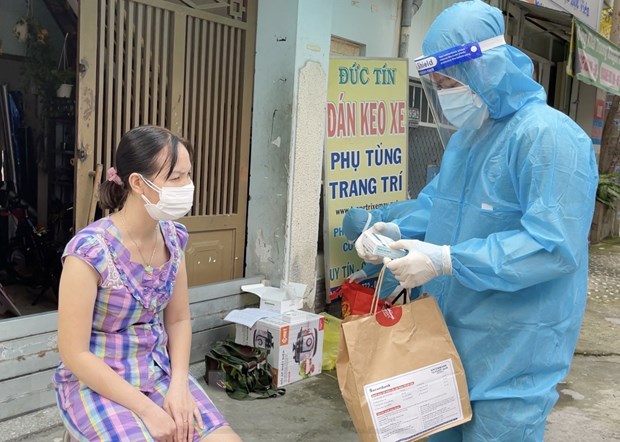 Society
Society

More than 200 mobile medical groups in HCM City’s Thủ Đức city are making a major difference in providing medical care to 8,000 - 9,000 COVID-19 patients at home.

|
| A member of the Bến Cát residential quarter mobile medical group in Phước Bình Ward in HCM City’s Thủ Đức city dispenses medicine to a COVID-19 patient being treated at home. — Photo nld.com.vn |
HCM CITY — More than 200 mobile medical groups in HCM City’s Thủ Đức City are making a major difference in providing medical care to 8,000 - 9,000 COVID-19 patients at home.
Dr Phạm Xuân Hải, deputy director of the Thủ Đức Medical Centre, told Người Lao Động (Labourer) newspaper the groups were set up to promptly take care of patients in the community.
”They provide patients getting treatment at home medical care in time.”
Medical facilities lack the capacity to treat patients if daily infections continue to rise, according to the official.
The 32 mobile stations set up are divided into 202 smaller groups that work in 199 residential quarters.
Since each group has a medical worker from ward-level health centres, they offer competent care while also reducing the burden on medical facilities, and also submit daily grassroots statistics and reports.
Their members are paid from the local fund for COVID-19 prevention.
Health centres, mobile medical stations and mobile medical groups organise daily briefings on new cases, testing, vaccination, and quarantine.
Trần Thị Thanh Chung, head of the Phước Bình Ward health centre, said nearly 100 local patients were being treated at home.
Since the mobile groups were set up, the ward’s pandemic prevention and control efforts had increased, she said.
“The mobile medical groups help provide good care to patients and reduce the workload on my health centre.”
Phạm Ngọc Vinh, leader of residential quarter No 1 in Phước Bình Ward, said the quarter now had nine mobile medical groups.
All were provided training and guidance in healthcare by the city Department of Health before they began their work.
The members included, besides him, also his deputy and members of local women’s unions and veterans’ associations.
Each group was in charge of 35-54 households.
Trần Thiện Thuận, leader of the group in Bến Cát residential quarter in Phước Bình Ward, said a Zalo group had been set up to disseminate information to residents in the residential quarter.
“It makes it convenient to immediately test suspected cases, manage distribution of drugs to patients at home and promptly transfer seriously ill patients to hospitals.”
N.T.H, 60, a patient at home in Bến Cát, said she felt more secure with the prompt medical assistance offered by the mobile group.
“It is an effective model that needs to be replicated.”
Tăng Chí Thượng, director of the city Department of Health, said the model would be improved and applied in other districts.
The groups are next expected to monitor high-risk people such as seniors and those with underlying health problems as authorities seek to provide better medical care, control serious cases and reduce the number of deaths. — VNS




